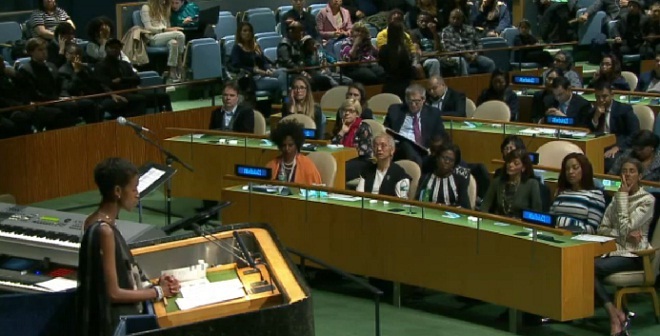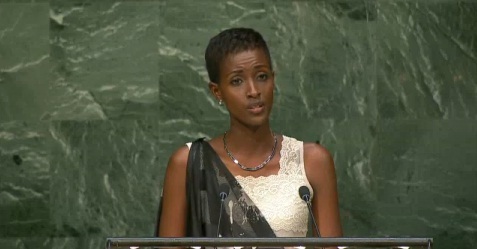Remarks by Nelly Mukazayire, Deputy Director of the Cabinet in the Office of the President, at the 22nd Commemoration of the Genocide Against the Tutsi at the UN

12 April 2016
Excellency Mr. Ban Ki-moon, United Nations Secretary-General,
Excellency Mr. Mogens Lykketoft, President of the United Nations General Assembly,
Excellency Mr. Eugène-Richard Gasana, Minister of State in Charge of Cooperation and Permanent Representative of Rwanda to the United Nations
Mr. Malcolm Hoenlein, Executive Vice Chairman, Conference of Presidents of Major American Jewish Organizations
Excellencies Permanent Representatives;
Distinguished Ladies and Gentlemen;
Fellow Rwandans,
It is an honor to be here with you to mark the 22nd commemoration of the Genocide against the Tutsi under the Theme: Remembering the Genocide against the Tutsi, Fighting Genocide Ideology” Thank you for inviting me to speak.
For the next one hundred days of Kwibuka, Rwandans and friends around the world will remember and honour those we lost, and comfort those who survived.
We also pay tribute to Rwandans and our leadership for their courage, sacrifices and resilience that brought Rwanda back to life.
What many around the world witnessed, through newspapers and TV screens in 1994, was the result of decades of colonialism, and post-colonial leadership that entrenched ethnic division, hate and discrimination.
- One million, seventy four thousand, and seventeen people, brutally killed in one hundred days
- Hundreds of thousands of orphans, widows, widowers, disabled people
- Almost the entire surviving population internally displaced or refugees in Zaire, Burundi, Tanzania
- Destroyed infrastructure: banks looted, schools and hospitals abandoned
- Collapsed state institutions
This is the apocalypse that met the RPF liberation movement that stopped the genocide. Rwandans felt abandoned during the genocide, and we were left alone to pick up the pieces. If I may recall some historical facts, today 11th April Belgian Peacekeepers withdraw from ETO school in Kicukiro, Kigali leaving 2000 Tutsi to be killed. Today, more than 100 Tutsi patients at Kigali Hospital were killed by Government soldiers.
If it wasn’t by the sacrifices of men and women lead by H.E our President Paul Kagame, there would be no Rwanda today.
The new post-genocide government, had to rebuild everything from scratch, including the hearts and minds, of a traumatized people.
The RPF led the creation of a Government of National Unity that became the corner-stone of the rebuilding process. It was underpinned by the principles of inclusion, fighting injustice, equal rights and opportunities for all Rwandans.
Being a child of a Genocide Perpetrator, my mother who is serving a life sentence in a Kigali prison, for her role during the Genocide, I am a result of that defying policy of equal rights and opportunities to all Rwandans and a living testimony of the new Rwanda.
In a complex post-Genocide environment, Rwandans have built an upright nation, where the child of a Genocide perpetrator and the child of a Genocide survivor, have equal access to education, health care, jobs, leadership position.
However, as much as the country’s politics sets the tone, the journey of healing and reconciliation requires a lot of every individual.

I was 12 years old when the Genocide happened. My two siblings and I lived with my father. During the whole period of Genocide, we had no idea where our mother was. My father knew but did not tell us because we were too young to understand and at our early age we thought our mother was dead.
The first time I learnt about my mother was in 1996. I was in the 2nd year of secondary school, when one of my fellow students showed me a newspaper article, with a picture of my mother, my name and names of our relatives. The headline was: Famous Interahamwe Captured.
It was the worst day of my life. One day I was a survivor, child of a Tutsi father, who had lost his parents and relatives in the Genocide, and instantly I became a child of a Genocide Perpetrator!
I went through a series of difficult phases:
First came denial. I simply refused to believe it. I decided that my mother was dead.
But society wouldn’t let me forget. I lost most of my friends who were genocide survivors. To them I was a liar and a traitor. I faced rejection from all sides and lost identity.
Next came facing the reality and acceptance. I eventually realized, that I could not run from reality forever. Everywhere I went, my mother’s reputation preceded me.
Indeed no one can run from the truth forever! Be it individual or countries, you can try to attenuate the situation, call it different names, defend yourself but facts do not fade or disappear… soon or later, one has to face them either as a victim then you embrace your history to build a brighter future or as an actor then you have to take responsibility and face consequences.
I decided to face the truth and started meeting my mother. It was tough and heart-breaking. I wanted to know the truth about what happened. At the same time, it was too much for me. There are things you never wish to hear from a parent, a mother.
 The Independent Uganda: You get the Truth we Pay the Price
The Independent Uganda: You get the Truth we Pay the Price






Heartbreaking. Nelly has demonstrated great courage. It should make us remember the many other innocent souls that are victims of circumstances but who suffer the pain quietly unable to pick up the courage to talk about it.
A young lady of great character and resolve. I salute you. Nelly, you are indeed fortunate to live in a country of inclusion and opportunity. Komera!